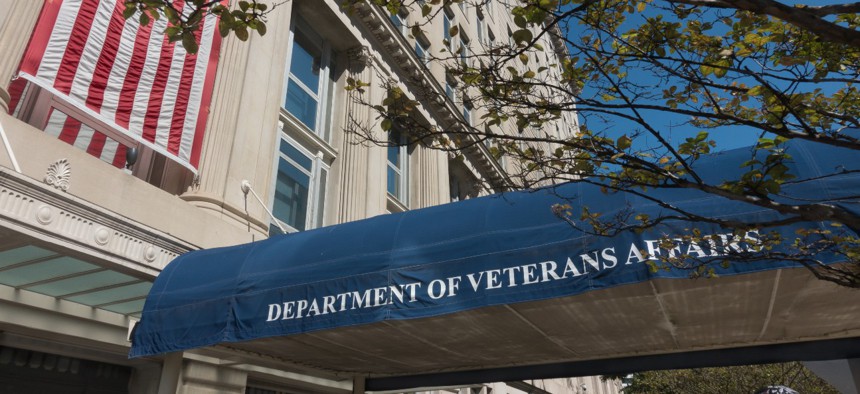VA Union Calls Management Proposals Illegal as Impasses Panel Legal Challenge Advances
AFGE officials accuse VA of submitting "illegal" proposals to a panel the union is separately trying to block from issuing decisions.
As a union representing employees at the Veterans Affairs Department pushes ahead with a lawsuit challenging the constitutionality of how the president appoints members of an agency tasked with settling collective bargaining disputes, it finds itself fighting a war on two fronts.
In the U.S. District Court for the District of Columbia, the American Federation of Government Employees' National VA Council has asked for an injunction blocking the Federal Service Impasses Panel from issuing decisions, arguing that the appointment of panel members without Senate confirmation violates the appointments clause of the Constitution and that the members are incapable of issuing impartial decisions as required by law. As that process plods forward, union officials must continue to participate in proceedings before the panel.
Last week, the union submitted its final defense of members' contract demands to the impasses panel, while the Justice Department asked a federal judge to dismiss AFGE's lawsuit on the panel's behalf.
In AFGE's filing, the union objected to VA's proposal to remove entire articles from the new collective bargaining agreement, which officials said could lead to constant bargaining disputes, and described many of the department's proposals as "contrary to law."
"Failure to cover numerous subjects in the [master collective bargaining agreement] places the parties in a perpetual state of bargaining, because a statutory bargaining obligation exists for uncovered matters," the union wrote. "Such a result is ineffective, inefficient and expensive . . . Further, failure to cover subjects in the agreement requires each VA facility to enact their own policies, which will lead to inconsistency."
The union also argued management proposals like, "the Department will follow applicable law, government-wide rules and regulations and departmental policy" would effectively exempt the department from bargaining over implementation of new regulations and policy changes, which the impasses panel has found to be illegal.
"In articles not fully struck [from the contracts], the department submits proposals that subordinate the [master collective bargaining agreement] to agency policy and future governmentwide rules and regulations," AFGE wrote. "[Here], the department's repeated and persistent proposals demand that the union waive its right to bargain terms and conditions of employment that are paramount to department policy and subsequently issued government-wide rules and regulations. This panel has been clear that it will not entertain such proposals."
AFGE also sought to prevent the impasses panel from implementing a recent trend in panel-imposed contracts: throwing out both the union and management's proposals for official time and substituting them with the text of a controversial 2018 executive order severely cutting the amount available to union representatives.
"Under the statute, only the [Federal Labor Relations Authority], and not the FSIP, may resolve a claim that a proposal is nonnegotiable," the union wrote. "Here, the authority has not addressed the negotiability or enforceability of proposals pertaining to the [executive] orders. If the panel imposes the terms of the E.O., the panel would have essentially made a negotiability determination—that the terms of the executive order were enforceable. The union, moreover, has a pending negotiability appeal on the issue of official time [before the FLRA]."
In federal court, Justice Department attorneys argued that the union's constitutional objections to the impasses panel's makeup should be dismissed because the court lacks jurisdiction to hear the case. In most cases, federal employee unions must first seek redress from the Federal Labor Relations Authority before they may file litigation.
"Because the [Civil Service Reform Act] offers a route to judicial review, [the National VA Council] must follow the statutory scheme through to completion—at the very least exhausting its administrative remedies before pursuing its claims in federal court," the government wrote. "[The] statute provides a route to meaningful administrative and judicial review of panel decisions–specifically, within the context of an unfair labor practice proceeding."
AFGE has argued in its own legal filings that the administrative review process is wanting in this instance: the FLRA is not empowered to make decisions on the constitutionality of an independent board's membership, and triggering an unfair labor practice complaint would require the union to refuse to adhere to the impasses panel's decision, a move that could risk decertification. But the Justice Department argued that the FLRA should still be consulted for its expertise on the statute.
"There is no reason to believe that the authority's interpretation of any provision of its enabling statute would not aid the court's consideration of the Appointments Clause, due process and statutory fitness claims raised here—all of which may require review of the specific functions of the panel and the authority in administering the statute's various provisions," the government wrote. "This is particularly so to the extent ruling on [the National VA Council's] claims calls on the court to assess the 'duties and functions' of the panel under the statute and whether the panel's current members are sufficiently knowledgeable in 'labor-management relations' or whether their activities create conflicts of interest that interfere with the panel's ability to function as an unbiased tribunal."
A motions hearing in the court case is scheduled for June 24, while the impasses panel is expected to issue its decision on the contract between AFGE and the VA in July.




